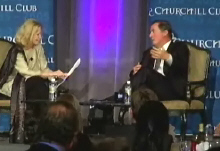Intel's Otellini fields softballs at the Churchill Club


At the same time, Sun has introduced the Niagra/UltraSparc T1 chip and will start shipping T1-based Sun Fire systems on Monday that will be priced at or below x86 servers from IBM, HP or Dell. Sun is claiming that it is establishing a five-year lead over any other processor architecture and is delivering systems that consume from a half to a third of the power and half to a quarter of the space of competitive chips. Even if the claims are half true, they have to be a cause for concern for Intel as well as AMD. Faster (multicore and massively ithreaded), cooler, smaller processors that can run Solaris (a free operating system) applications without rewriting any code is a compelling selling proposition.
As I wrote a few days ago, it's time for Intel's CEO Paul Otellini to dust off Andy Groves book, "Only the Paranoid Survive : How to Exploit the Crisis Points That Challenge Every Company," At last night's Churchill Club 20th anniversary event, Otellini was the featured guest and sat down for an interview with NPR's Moira Gunn. The softball interview touched on his 31 years at Intel, the company reorg around markets, WiMax as a step toward a global Internet and the social duties (hanging out with Prince Charles and Camilla in San Francisco) that come with being the CEO of a Silicon Valley icon. No tough questions about AMD, Sun, Itanium or antitrust suits.
Otellini did address the power consumption issue (see video clip), saying that "energy at the chip and system level is one of the critical things the industry needs to change." He citing the fact that for Google today, electricity costs outpace hardware costs, and acknowledged that using less energy and shifting to parallelism (multicore/multithreaded chips) to increase performance is a big challenge for Intel.
Sun says that the UltraSparc T1, running at 1.2GHz and Solaris, consumes about 70 watts, compared to is a practical maximum of 135 watts for a dual-core Intel Xeon processor and 95 watts for a dual-core AMD Opteron.
At the Intel Developer Forum on August 23, Otellini said that by the end of the decade Intel will deliver a 10x reduction in energy consumption across a variety of devices and 10x the performance of today's products. Targets for power consumption are five watts per portable system, 65 watts for desktops and 80 watts for servers. At this point, Intel has some catching up to do.
During the conversation, Otellini also reminisced about his stint as Andy Grove's assistant (see video clip). "What I took away from my year as [Grove's] assistant is the requirement, discipline and rigor to be intellectually honest--you can't even attempt to pull the wool over his eyes." Otellini also knows that customers who understand the new economics of computing (performance per watt) will look for the best value proposition and won't have any wool pulled over their eyes...
We'll have several video clips from the Churchill Club event up soon.
Update: Following are all the video clips from Otellini's Churchill Club interview
Intel CEO Paul Otellini on future wireless